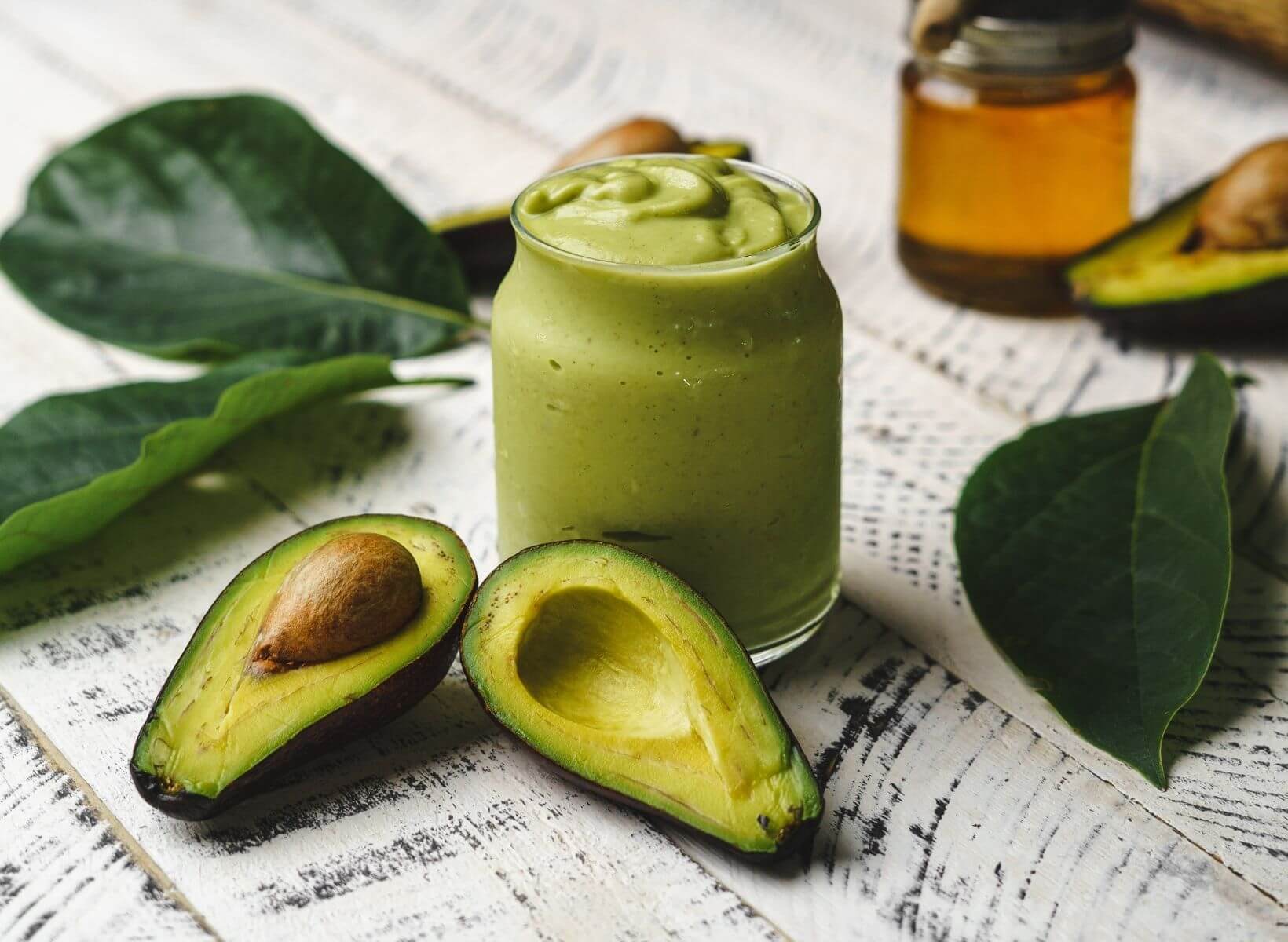Kefir is a fermented drink made from various ingredients, the most popular being cow’s or goat’s milk. Its roots can be traced back thousands of years to Eastern Europe and the Caucasus regions but have since spread worldwide.
The benefits of kefir stem from its status as a probiotic food, meaning it is full of beneficial bacteria that can improve gut health. Still, other compounds and nutrients in kefir may add even more benefits to your overall health.
In this article, you’ll learn about kefir, its potential health benefits, and even how to make it at home.
What is Kefir?
Kefir is traditionally made from milk (although dairy-free options are available), creating a tart beverage similar to drinkable yogurt. It has a smooth texture and is often enjoyed plain or flavored with fruit or sugar.
Unlike fermented foods, kefir is made from kefir grains. Kefir grains are small, light-colored clusters of bacteria and yeast resembling cauliflower heads. Their microbial makeup differs depending on the geographical location they came from. 1
Kefir grains use the sugars and other nutrients in milk to produce lactic acid, alcohol, and carbon dioxide, giving it its unique flavor. The liquid thickens and adds a tangy taste as it ferments over 24 to 48 hours. Kefir grains are then saved and used for the next batch (and more are created in fermentation). 1
Due to this natural fermentation process, kefir is high in probiotics, so its popularity has increased with the rising interest in gut health. Probiotics are live microorganisms (good bacteria) that confer positive health benefits for mental health, immunity, blood sugar balance, weight maintenance, and more.
The probiotics found in kefir may be especially helpful because they are resistant to the acidic environment of the stomach and able to attach to the intestinal wall.
As a result of its rising popularity, finding kefir in the grocery store is much easier than it used to be. You’ll likely see it near the yogurt section in many different flavors. However, some of the mass-produced kefir options may not have as many probiotics because the type of starter culture used for fermentation differs from the original kefir grains. 1
{{mid-cta}}
Kefir vs. Yogurt
Kefir and yogurt are fermented dairy products with similar ingredients, but their differences can be found in the fermentation process. Kefir uses grains, as mentioned above, while yogurt uses a bacterial starter culture.
Both kefir and yogurt may contain probiotics, although not all yogurt has live active cultures. Kefir also has more probiotics than yogurt, and fermentation can produce more beneficial acids.
Types of Kefir
Milk is traditionally used to make kefir as the fermentation process preserved the shelf life of surplus milk before modern refrigeration. However, other types of animal milk may be used. Non-dairy options are also available for those who don’t consume animal products or who want to limit their dairy intake.
Types of kefir include:4
- Cow milk
- Goat milk
- Sheep milk
- Camel milk
- Buffalo milk
- Almond milk
- Water kefir
- Coconut water kefir
- Fruit juice-based kefir
The fermentation process of each of these products creates similar metabolic byproducts, but the actual microbial diversity (how many different strains are present) of the probiotics found in each one can vary. 1
Water or juice-based kefir contains added sugar for fermentation (milk has natural sugar that the microbes ferment), but the end product has less sugar than what was added because the microbes use that sugar for fuel. Note that water kefir also differs from kombucha because of the kefir grains.
Kefir Nutrition Facts
The nutritional profile of kefir depends on the type of milk or other liquid used. Whole milk kefir will differ in overall fat content from kefir made with nonfat milk. Water kefir will not contain protein, while dairy-based kefir does.
The glycemic index also varies depending on the type of kefir used and whether anything is added to the kefir after fermentation. For example, many commercially made kefir options have added flavors and sugar to make the tangy taste more palatable to the consumer (similar to flavored yogurt). More sugar means a higher glycemic index.
As an example, 1 cup of plain, unflavored kefir made with low-fat milk contains:
- 104 calories
- 9 grams protein
- 2 grams fat
- 12 grams carbohydrate
- 316 mg calcium (almost 25% of total daily value)
- 29 mg magnesium
- 399 mg phosphorus
- 350 mg potassium
Water kefir won’t contain the fat, protein, and the same micronutrient composition, but it will provide probiotic benefits.

What is It Good For? 8 Potential Health Benefits of Kefir
- Nutrient-dense. As noted above, kefir contains several essential vitamins and minerals and is an excellent source of protein. Drinking a glass of kefir helps meet your daily needs for these nutrients.
- Antibacterial properties. More research is needed, but cell studies have found that kefir may have antibacterial and antifungal properties, especially against gram-positive bacteria (like staphylococcus). While not a replacement for medication, kefir could be an additional tool for specific conditions (always talk to your doctor first).4
- Supports gut health. The probiotics in kefir may be the primary reason people talk about its gut-supporting properties. Kefir can contain more than 60 different types of organisms to support the diversity of healthy bacteria in the gut. This can help with digestive conditions like constipation but also support all the other functions of the gut microbiome, as diversity is a critical component of a healthy gut microbiome.
- Provides bone-building nutrients. Milk-based kefir contains almost 25 percent of the daily value of calcium, phosphorus, and magnesium, which all work together to support bone health. Drinking kefir may be an easy way to help meet your daily needs for these minerals.6
- Blood sugar support. Researchers found drinking kefir supported lower fasting blood sugar levels and overall glycemic control (measured by HbA1c, a three-month average of your blood sugar levels) for people living with diabetes. The probiotics in kefir may be responsible for these benefits as they can help reduce inflammation and oxidative stress contributing to blood sugar dysregulation.
- Lower in lactose. Lactose intolerance is a common food intolerance where someone lacks the enzyme to break down lactose. Dairy-based kefir contains less lactose because the enzymes present in kefir grain (called B-galactosidase) break down around 30 percent of the lactose initially present, making it a possible choice for people with lactose intolerance. 4
It’s important to note that lactose sensitivity can range, so not everyone with lactose intolerance will respond the same. It’s best to start with a small amount and work up as needed.
- Anti-inflammatory properties. Kefir has been found to contain anti-inflammatory properties, which may be related to some of the beneficial microorganisms it contains. These are primarily cell and animal studies, so more research is needed. Still, studies suggest that some of the compounds found in kefir could lower cells mediating inflammation.4
- Heart healthy. Drinking kefir could support healthy cholesterol levels and blood pressure, although more research is needed. Much of this is related to the benefits of probiotics for metabolic health.4 One study found that drinking kefir significantly reduced total and LDL cholesterol levels for women compared to controls (although similar results were seen for women drinking low-fat milk).4
Potential Side Effects of Kefir
Kefir is generally considered safe. There aren’t many disadvantages of kefir, although there may be instances where people with weakened immune systems shouldn’t ingest probiotics or live cultures. Check with your healthcare provider if you have any questions or concerns.
Occasional bloating or gas could be a potential reaction to kefir, but these are highly individualized. Like any food, there can be differing reactions, especially if you have a sensitivity or a health issue that affects digestion. If you drink kefir and it doesn’t feel good to your body, there’s no need to continue drinking it (or it may be worth chatting with a dietitian to see why you are reacting that way).
How to Use Kefir
Ready to incorporate more kefir into your diet? It’s easy to add and reap the benefits. Just check the ingredients, so you don’t inadvertently add unintended sugar.
Here are a few ways to use kefir:
- Use it as a base for your daily smoothie for extra protein and probiotics.
- Add it to your oats for a creamy texture and added protein.
- Drink a glass for breakfast or a snack.
- Swap in plain kefir for plain yogurt in your favorite recipes.
- Make a kefir-based dressing for salads and grains.

How to Make Homemade Kefir
Making homemade kefir is a fun project that can be done easily at home. It requires kefir grains, which can be purchased online or at health food stores. You’ll also want to decide what type of kefir to make. Water kefir grains are often sold separately from dairy kefir.
Once you have your materials, ensure everything is sanitized and clean so no extra bacteria can spoil the kefir.
Here is a general overview of how to make kefir with low-fat milk.
- Wash your hands before getting started.
- Mix 1 teaspoon of kefir grains with 1 cup of milk in a glass jar.
- Use a paper towel, coffee filter, napkin, or cheesecloth to cover the jar and hold it in place with a rubber band.
- Allow the kefir to ferment at room temperature (around 68 to 79 degrees is ideal) for 24 hours on your kitchen counter. During fermentation, the liquid should thicken but still be thinner than yogurt.
- After 24 hours, pour the kefir through a mesh strainer to separate and keep your kefir grains (store them in your fridge until the next batch).
You’ll need to refrigerate your kefir after the fermentation process. It will last around a week if kept tightly covered. Some people shorten their fermentation time to make the kefir a little sweeter, while a longer ferment creates a more tangy end product.
Learn More About Your Nutrition and Improve Your Eating Habits with Signos
Takeaways:
- Kefir is a fermented beverage made from milk or non-dairy liquids.
- The probiotics in kefir provide significant health benefits.
- Store-bought kefir is available but also simple to make at home.
The best way to know if kefir works well for your body is to do a little self-experimentation. You can see exactly how your blood sugar responds to kefir using a continuous glucose monitor (CGM) and the Signos app.
You can even try different types or flavors of kefir to see how your body responds. Maybe water kefir spikes your blood sugar, but low-fat milk-based kefir doesn’t. That’s what makes Signos so powerful: you get to see what happens when you make dietary changes in real-time and adjust accordingly.
Find out if Signos is a good fit for you by taking a quick quiz.
- Item 1
- Item 2
- item 3
Topics discussed in this article:
References
- Azizi, N. F., Kumar, M. R., Yeap, S. K., Abdullah, J. O., Khalid, M., Omar, A. R., Osman, M. A., Mortadza, S. A. S., & Alitheen, N. B. (2021). Kefir and Its Biological Activities. Foods (Basel, Switzerland), 10(6), 1210. https://doi.org/10.3390/foods10061210
- Kerry, R. G., Patra, J. K., Gouda, S., Park, Y., Shin, H. S., & Das, G. (2018). Benefaction of probiotics for human health: A review. Journal of food and drug analysis, 26(3), 927–939. https://doi.org/10.1016/j.jfda.2018.01.002
- Golowczyc, M. A., Gugliada, M. J., Hollmann, A., Delfederico, L., Garrote, G. L., Abraham, A. G., Semorile, L., & De Antoni, G. (2008). Characterization of homofermentative lactobacilli isolated from kefir grains: potential use as probiotic. The Journal of dairy research, 75(2), 211–217. https://doi.org/10.1017/S0022029908003117
- Rosa, D. D., Dias, M. M. S., Grześkowiak, Ł. M., Reis, S. A., Conceição, L. L., & Peluzio, M. D. C. G. (2017). Milk kefir: nutritional, microbiological and health benefits. Nutrition research reviews, 30(1), 82–96. https://doi.org/10.1017/S0954422416000275
- Fiorda, F. A., de Melo Pereira, G. V., Thomaz-Soccol, V., Rakshit, S. K., Pagnoncelli, M. G. B., de Souza Vandenberghe, L. P., & Soccol, C. R. (2017). Microbiological, biochemical, and functional aspects of sugary kefir fermentation-A review. Food Microbiology, 66, 86-95.
- FoodData Central. (n.d.). https://fdc.nal.usda.gov/fdc-app.html#/food-details/170904/nutrients
- Bourrie, B. C., Willing, B. P., & Cotter, P. D. (2016). The Microbiota and Health Promoting Characteristics of the Fermented Beverage Kefir. Frontiers in microbiology, 7, 647. https://doi.org/10.3389/fmicb.2016.00647
- Ostadrahimi, A., Taghizadeh, A., Mobasseri, M., Farrin, N., Payahoo, L., Beyramalipoor Gheshlaghi, Z., & Vahedjabbari, M. (2015). Effect of probiotic fermented milk (kefir) on glycemic control and lipid profile in type 2 diabetic patients: a randomized double-blind placebo-controlled clinical trial. Iranian journal of public health, 44(2), 228–237.
- Gomes, A. C., Bueno, A. A., de Souza, R. G., & Mota, J. F. (2014). Gut microbiota, probiotics and diabetes. Nutrition journal, 13, 60. https://doi.org/10.1186/1475-2891-13-60
- Hertzler, S. R., & Clancy, S. M. (2003). Kefir improves lactose digestion and tolerance in adults with lactose maldigestion. Journal of the American Dietetic Association, 103(5), 582–587. https://doi.org/10.1053/jada.2003.50111
































